21情态动词
(完整版)情态动词用法归纳

情态动词用法归纳情态动词有can (could), may (might), must, have to, shall (should, will (would), dare (dared), need (needed), ought to等. 情态动词无人称和数的变化;不能单独使用,必须与其后的动词原形构成谓语一、 can, could1) can, could表示能力(体力、知识、技能). Can you lift this heavy box?(体力)Mary can speak three languages。
(知识) Can you skate?(技能)此时可用be able to代替.用be able to改写上面三个句子。
Can只有一般现在时(can)和一般过去式(could);而be able to则有更多的时态。
am/is/are able to(一般现在时):I am able to do this job,其它几个自己改写was/were able to(一般过去式): He was able to do this jobwill be able to(一般将来时):I will(won't) be able to do this job this afternoonI'll not be able to come this afternoon.当表示“经过努力才得以做成功某事”时应用be able to,不能用Can.如:He can’t swim,but he is able to cross the river.2) can, could表示请求和允许。
—-———Can I go now? =May I go now?——-—- Yes, you can。
/ No,you can’t.=Yes,you may。
/No,you may not.此时可与may互换。
最新版-英语情态动词专项复习

we can see his name on it .
7
4. need (需要) 既可做实义动词也可做情态动词 1)实义动词 need to do sth 需要做某事
Eg: I need to buy a big house . --- Do you need to buy a big house ? --- Yes , I do . No, I don’t . He needs to borrow a map . --- Does he need to borrow a map ?
Yes ,you may. No, you mustn’t. No, you can’t.
Yes, you must. No, you needn’t. No you don’t have to
Yes, you must. No, you needn’t
1.Must I take the keyboard to the office now ?
2) 情态动词 need do sth 需要做某事 Eg: I need buy a big house .
8
5. have to
不得不
Eg: It’s eleven o’clock . I have to go now .
He has to finish the work first .
请注意: I don’t have to go now .
--No, you __C___.Tomorrow is Saturday .You
may get up later.
A mustn’t
情态动词的用法归纳
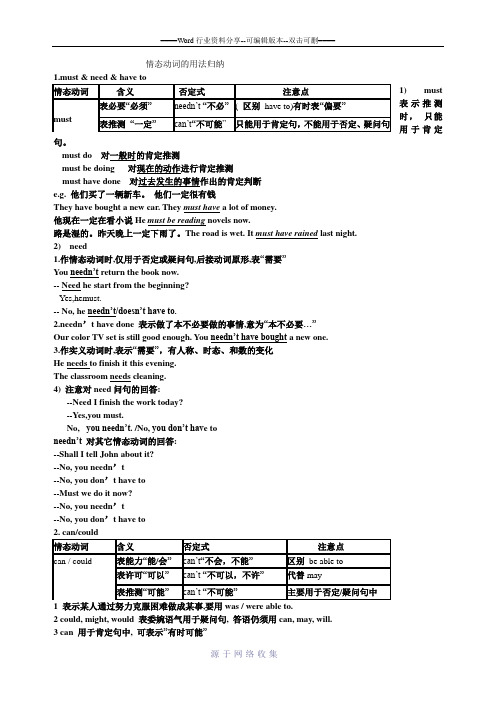
情态动词的用法归纳1) must 表示推测时, 只能用于肯定句。
must do 对一般时的肯定推测must be doing 对现在的动作进行肯定推测must have done 对过去发生的事情作出的肯定判断e.g. 他们买了一辆新车。
他们一定很有钱They have bought a new car. They must have a lot of money.他现在一定在看小说He must be reading novels now.路是湿的。
昨天晚上一定下雨了。
The road is wet. It must have rained last night.2) need1.作情态动词时,仅用于否定或疑问句,后接动词原形,表“需要”You needn’t return the book now.-- Need he start from the beginning?--Yes,hemust. -- No, he needn’t/doesn’t have to.2.needn ’t have done 表示做了本不必要做的事情,意为“本不必要…”Our color TV set is still good enough. You needn’t have bought a new one.3.作实义动词时,表示“需要”,有人称、时态、和数的变化He needs to finish it this evening.The classroom needs cleaning.4) 注意对need 问句的回答:--Need I finish the work today?--Yes,you must.No,you needn’t . /No, you don’t hav e toneedn’t 对其它情态动词的回答:--Shall I tell John about it?--No, you needn ’t--No, you don ’t have to--Must we do it now?--No, you needn ’t--No, you don ’t have to1 表示某人通过努力克服困难做成某事,要用was / were able to.2 could, might, would 表委婉语气用于疑问句, 答语仍须用can, may, will.3 can 用于肯定句中, 可表示”有时可能”4. can/could have done “本可以,本可能做某事” 用于肯定句中,表示对过去发生的事情做出的判断。
情态动词归类大全

情态动词一:情态动词的用法:常用的情态动词有can,may,must,need,should, had better.1. can 的用法:①表示能力“能,会” eg: He can speak a little Japanese.他会说一点日语。
②表示请求或许可“可以” eg: Can I help you 要我帮忙吗③表示猜测“可能” eg: Where can she go now 她可能到哪里去了呢的用法:①表示请求或允许“可以”“准许” eg: May I go home,please请问我可以回家吗②表示可能性“可能”、也许” eg: I think it may rain this afternoon. 我想今天下午可能下雨。
注:might为may的过去式,但也可以代替may,语气较为婉转客气或更加不肯定。
eg: ① He might not come today.今天他也许不来了。
(语气不肯定)②You might also get a headache when you work too hard,当你工作太努力时,你也可能患头痛3. must的用法:①表示义务、必要或命令“必须、应该” eg: You must come early tomorrow.你明天得早来。
②表示推测时“肯定,一定” eg: They must be at light is on 他们肯定在家,灯亮着呢.③ must not 禁止,不许 eg: You must not tell lies. 你不许撒谎。
注意:①must开头的疑问句,其否定回答通常用 don't have to 或needn't 。
而不用mustn'teg: ---Must I finish my homework first 我必须先完成作业吗---No, you don't have to/ needn't. 不,你不必。
情态动词用法大全
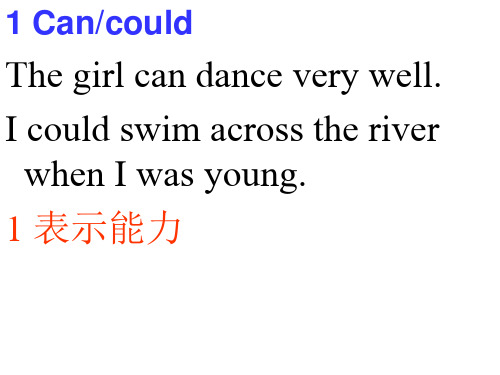
The girl can dance very well. I could swim across the river when I was young. 1 表示能力
---Can I go now?
---yes, you can. 2 表示请求和允许,多用于否定
与疑问结构中。表示请求,口语 中常用could代替can.
The fire spread through the hotel, but everyone was able to get out.
2 May/ might
---May I come in ?
---Yes, please.
1 表示请求、允许;比can正式:答 语避免使用may,以免显得太严 肃或太不客气.might比may 的 语气更委婉。
• What shall we do now?我们现 在该怎么办?
• Shall I write it down?要我记下 来吗?
• Shall he come in?要他进来吗
• 1 用于第一,三人称的疑问句中, 表示说话人征求对方意见和向对 方请示。
You shall have it back tomorrow.
You must come to school on time.
1 表示“必须;应该”着重说话 人的主观看法。
• It must be our headteacher.
• 2 表示有把握的推测,只用于肯 定句。
• I have to go now
• 表示“必须;不得不” 强调客 观需要
• 5 Shall
It may be a trick.
He might have some fever.
复习专题——情态动词知识点归纳经典1

复习专题——情态动词知识点归纳经典1一、初中英语情态动词1.— I take the magazine out of the reading room?— I'm sorry you .A. Could; couldn'tB. Must; couldn'tC. Will; can'tD. May; can't【答案】 D【解析】【分析】句意:——我可以把杂志带出阅览室吗?——对不起,你不能。
could 能,可以;must必须;will将;may可以;can能,可以,can't不可以,不能。
此处表示请求许可,用could或者may,由could或者may构成的一般疑问句,肯定回答用yes,主语+can,否定回答用sorry,主语+can't,结合选项,故答案选D。
【点评】考查情态动词的辨析。
注意理解句意,理解选项,根据语境,选出正确的答案。
2.—Where is Monica? I can't find her anywhere.—She be in the library. She loves reading books when she is free.A. mustB. needC. can't【答案】 A【解析】【分析】句意:——莫妮卡在哪?我到处都找不到她。
——她肯定在图书馆,她喜欢空闲时看书。
A肯定,肯定句中表示推测,B需要,C不可能,否定句中表示推测,根据 She loves reading books when she is free ,可知是肯定句表示推测,故选A。
【点评】考查情态动词,注意情态动词表推测的用法。
3.Teenagers allowed to drive .A. should not beB. should be notC. not should be【答案】A【解析】【分析】句意:年轻人不应该被允许驾车。
2021年上海市中考英语语法复习:情态动词讲解及提升练习(有答案)
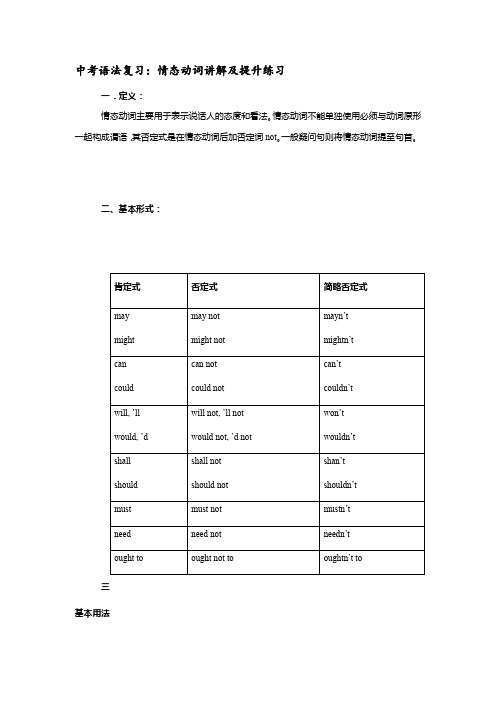
中考语法复习:情态动词讲解及提升练习一.定义:情态动词主要用于表示说话人的态度和看法。
情态动词不能单独使用必须与动词原形一起构成谓语,其否定式是在情态动词后加否定词not。
一般疑问句则将情态动词提至句首。
二、基本形式:三基本用法1. can 的用法1)表能力can表能力时意味着凭体力或脑力或技术等可以无甚阻力地去做某事。
I can climb this pole. 我能爬这根杆子。
He is only four , but he can read. 他只有4岁,但已认得字了。
Fire can’t destroy gold. 火烧不毁金子。
2)表可能性多用于否定与疑问结构中,但也可用在肯定句中。
Can the news be true? 这消息可能是真的吗?It can’t be true. 它不可能是真的。
What can he possibly mean? 他可能是什么意思?3)表示允许(和may意思相近)常见于口语。
Can (May) I come in ? 我能进来吗?Can I smoke here ? 我可以在这里抽烟吗?2.could的用法1)表过去的可能和许可,Father said I could swim in the river. 爸爸说我可以在河里游泳。
2)表过去的能力I could swim when I was only six. 我刚六岁就能游泳。
3)表“允许”。
可表示委婉客气的提出问题或陈述看法,不是can的过去时态。
---Could I use your bike? ---Yes, you can./No, you can’t.注意:be able to 表示能力,意为“能够做成某事”,相当于can 的用法,但是有区别:can泛指一般的能力;be able to 则主要指成功做了某件事的能力。
3. may(might)的用法1)表示请求、可以、允许。
You may drive the tractor. 你可以开那台拖拉机。
英语语法英语情态动词用法及例题
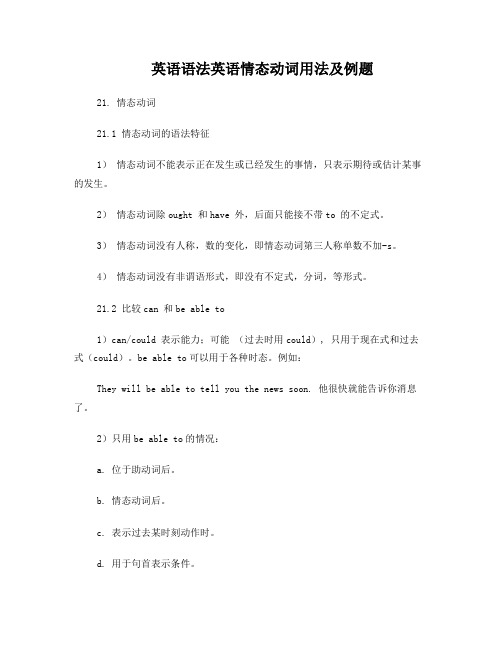
英语语法英语情态动词用法及例题21. 情态动词21.1 情态动词的语法特征1)情态动词不能表示正在发生或已经发生的事情,只表示期待或估计某事的发生。
2)情态动词除ought 和have 外,后面只能接不带to 的不定式。
3)情态动词没有人称,数的变化,即情态动词第三人称单数不加-s。
4)情态动词没有非谓语形式,即没有不定式,分词,等形式。
21.2 比较can 和be able to1)can/could 表示能力;可能(过去时用could), 只用于现在式和过去式(could)。
be able to可以用于各种时态。
例如:They will be able to tell you the news soon. 他很快就能告诉你消息了。
2)只用be able to的情况:a. 位于助动词后。
b. 情态动词后。
c. 表示过去某时刻动作时。
d. 用于句首表示条件。
e. 表示成功地做了某事时,用was/were able to,不能用could。
例如:He was able to flee Europe before the war broke out. = He managed to flee Europe before the war broke out.他在战争爆发之前逃离欧洲。
注意:could有时不表示时态1)提出委婉的请求,(注意在回答中不可用could)。
例如:--- Could I have the television on? 我能看电视吗?--- Yes, you can. / No, you can't. 可以/不可以。
2)在否定句、疑问句中表示推测或怀疑。
例如:He couldn't be a bad man. 他不大可能是坏人。
21.3 比较may和might1)表示允许或请求;表示没有把握的推测;may 放在句首,表示祝愿。
例如:May God bless you! 愿上帝保佑你!He might be at home. 他可能在家。
初中情态动词的用法总结知乎

情态动词(Modal Verbs)是一类用于表达说话人的意愿、能力、推测、请求、建议等情态的动词。
英语中常见的情态动词包括 can, could, may, might, will, would, shall, should, must 等。
以下是情态动词的用法总结:1. Can / Could:•能力:"Can" 表示一种具有能力或技能的能力,而"could" 表示过去的能力。
–I can swim.(我会游泳。
)–When I was younger, I could run very fast.(在我年轻的时候,我能跑得很快。
)•请求和允许: "Can" 和 "could" 可以用于请求和征求许可。
–Can I borrow your pen?(我能借用你的笔吗?)–Could I go to the bathroom, please?(我可以去洗手间吗?)2. May / Might:•请求和许可: "May" 和 "might" 也可用于请求和征求许可,尤其是在正式场合中。
–May I have a moment of your time?(我可以占用你一点时间吗?)–Might I suggest an alternative solution?(我可以提出一个替代方案吗?)•可能性和推测: "May" 和 "might" 用于表示可能性和推测。
–It may rain later.(可能会下雨。
)–She might be at home.(她可能在家。
)3. Will / Would:•意愿和承诺: "Will" 表示未来的意愿或承诺,而 "would" 通常用于表示过去或用于礼貌的请求。
高考英语情态动词课件(共21张PPT)
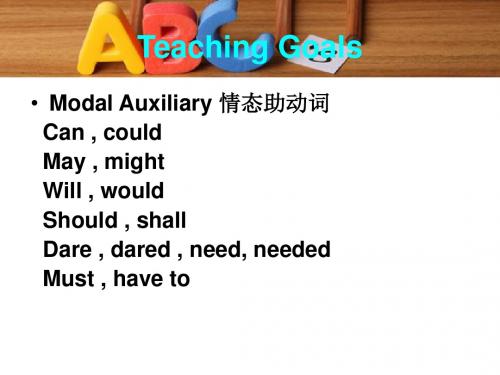
5)Should 表示说话人的惊奇、愤怒、失望等特殊情感 It’s surprising that Mary should love such a person as Jack. It’s strange that … It’s unthinkable that … I’m sorry that…
肯定疑问 Dare we run? 句
Do we dare (to) run?
否定疑问 Dare he not run? Doesn’t he dare to run ? 句
Need, needed
Need /needed
1、情态动词用于否定句,疑问句 He needn’t worry about it.
This will be the house you're looking for .
Will , would
5)would常用于虚拟条件句,表示与事实相反或不太可能实现的情况 But for your help we would have been late .
6) Would 表示过去的习惯性动作或某人的一典型动作,又使人厌烦的感 觉。 He would go swimming in summer when he was in the countryside.
3.表示请求和允许,与may同义,相当于be allowed to.常用语口语中。 You can smoke in this room. Could I borrow you dictionary?
Can , could
4.用于一些固定句型 a. Cannot ( can never) …too…怎么也不过分
如询问某种可能时,应用can。 He must know my address. (一定) He can’t know my address. (一定不) Can he know my address? (询问可能性)
情态动词用法详解
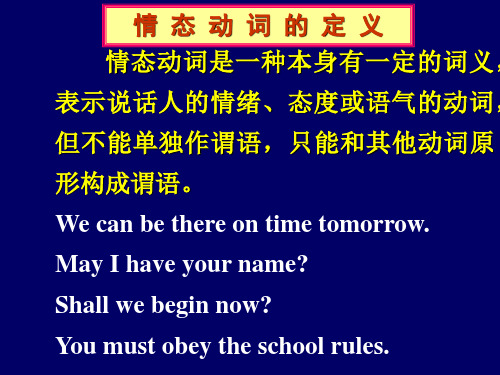
I need a bike to go to school.
Do you need a dictionary?
She needs a necklace.
注意:“needn‘t + have + 过去分 词” 表示过去做了没必要做的事 情。
After such a long walk, you must be tired. 走了这么长的路, 你一定累了
He must be the man I am looking for. 他 一定是我要找的人。
He had to go because of somebody’s calling him that day. 那天他要走,因为 有人叫他。
情态动词的用法
1. can (could) 表示说话人“能, 可以, 同意, 准许”, 以及客观条件许可, could 为 can 的过去式。 Can you pass me the books? Could you help me, please? What can you do? 你能干点什么呢? Can you be sure? 你有把握吗?
may 否定式为 may not, 缩写形式是 mayn’t。might 是may 的过去式,有两 种用法,一种表示过去式,一种表示虚 拟语气,使语气更加委婉、 客气或对 可能性的怀疑。
He told me he might be here on time. Might I borrow some money now?
I have to cook for my child.
4. need 情态动词,“需要”,多用在否 定式或疑问句中.
Need I attend the meeting tomorrow? You need not hand in the paper this week. 这一周你不必交论文。
21版:情态动词和虚拟语气(创新设计)

@《创新设计》
5.should (1)should=ought to,意为“应该”。可表示义务上的“应该”,也可表示推测上的 “按说应该”。 He should/ought to arrive by now.现在他按说应该到了。(推测上的“按说应该”) (2)竟然,表示出乎意料。 It’s strange that he should be late.真奇怪,他竟然会迟到。 (3)用于条件状语从句中。意为“万一”。 If I should be free tomorrow,I’ll come.万一明天有空,我就来。
11
6.will/would (1)表示意愿:用于各种人称,表示主语的意愿和意志。 He will/would take you home.他愿意送你回家。 (2)表示请求:与第二人称的一般疑问句连用,表示请求、建议。 Will/Would you go with me?你愿意和我一起去吗? (3)表示习惯:will用来叙述目前的习惯; would 表示过去的习惯。 He would get up early when he was in the country. 他住在乡下时总是早起。
过去本不应该做某事但实际上做了
might have done
过去可能做某事但实际上没做
He could have gone on regretting it,as too many of us do.他本可以继续为此而遗憾,
正如我们中很多人一样。
You needn’t have worked that late last night.It was harmful to your health. 你昨天晚上本不必工作那么晚,那对你的健康有害。
@《创新设计》
广州市小学英语分类词汇表
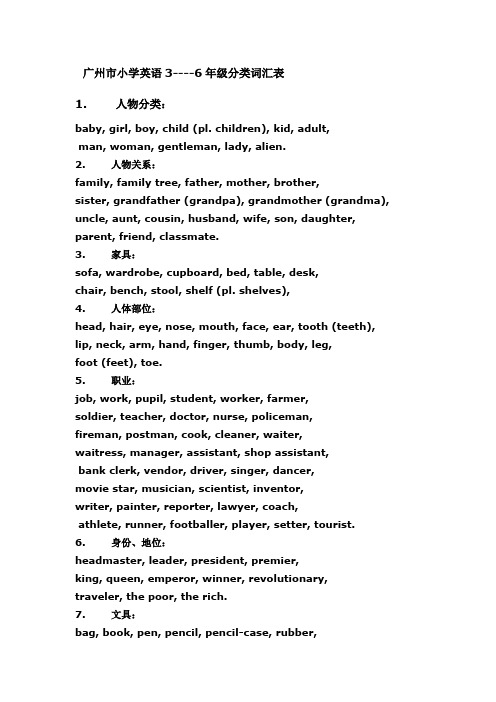
广州市小学英语3----6年级分类词汇表1. 人物分类:baby, girl, boy, child (pl. children), kid, adult,man, woman, gentleman, lady, alien.2. 人物关系:family, family tree, father, mother, brother,sister, grandfather (grandpa), grandmother (grandma), uncle, aunt, cousin, husband, wife, son, daughter, parent, friend, classmate.3. 家具:sofa, wardrobe, cupboard, bed, table, desk,chair, bench, stool, shelf (pl. shelves),4. 人体部位:head, hair, eye, nose, mouth, face, ear, tooth (teeth), lip, neck, arm, hand, finger, thumb, body, leg,foot (feet), toe.5. 职业:job, work, pupil, student, worker, farmer,soldier, teacher, doctor, nurse, policeman,fireman, postman, cook, cleaner, waiter,waitress, manager, assistant, shop assistant,bank clerk, vendor, driver, singer, dancer,movie star, musician, scientist, inventor,writer, painter, reporter, lawyer, coach,athlete, runner, footballer, player, setter, tourist.6. 身份、地位:headmaster, leader, president, premier,king, queen, emperor, winner, revolutionary,traveler, the poor, the rich.7. 文具:bag, book, pen, pencil, pencil-case, rubber,ruler, blackboard, pencil-sharpener,tape recorder, paper, stamp, map, picture,photo (photograph), card, computer, notebook, board, board-rubber, album, tool, chalk,dictionary, story book, exercise book, letter.8. 家居用品:cup, glass, pillow, tissue, watch, clock,glasses, knife (knives), umbrella, postcard,candle, bowl, plate, bottle, box, pot,stick, plate, raincoat, fridge, TV, computer,camera, radio, lamp, light, CD, VCD, telephone (phone) 9. 房子部分:room, living room, bedroom, study, dinning room,washroom, bathroom, toilet, kitchen, garden,garage, upstairs, downstairs, floor, window,door, wall, ceiling.10. 学校场所、设施:classroom, teachers’ office, headmaster’s office, computer room, clinic, canteen, playground,library, field, flowerbed, swimming pool,lab, gate, gym, baton, toilet, office.11. 学校科目:subject, Chinese, maths, English, history,science, PE, art, music.12. 交通工具:transport, bus, car, bike, taxi, ship, boat,train, plane, underground, ambulance,spaceship, motorbike, truck.13. 建筑、场所:building, school, house, apartment, factory,farm, shop, bank, park, hill, mountain, river,zoo, road, street, hotel, police station,TV station, railway station, train station,post office, cinema, hospital, market, supermarket, restaurant, bookstore, bookshop, shopping center, temple, palace, Children’s Palace, museum, field, top.14. 洲、国家、城市:country, capital, city.Asia, Asian, Africa, Europe, North America,South America, Arctic, Antarctic.Australia, China, the USA (America), Canada,the UK (Britain England), France, Germany,Japan, Italy, India, Russia, New Zealand, Singapore. London, Paris, Berlin, Rome, Tokyo, Washington D.C., Beijing, Wellington, Canberra, Sydney, New York, Toronto, Moscow, Singapore, Leeds,15. 国籍、语言:nationality, languageAustralian, American, British, English,Chinese, Canadian, French, German, Italian, Indian, Japanese, Russian16. 服装:clothes, shirt, T-shirt, shorts, dress,blouse, skirt, coat, uniform, sweater,jacket, jeans, trousers, sock, stocking,shoe, sport shoes, hat, cap,17. 颜色:colour, red, yellow, blue, green, orange,purple, black, white, brown, pink, blonde,gold, grey, dark green, light blue.18. 体育运动:the high jump, the long jump, running,swimming, skipping, kung fu, weight-lifting,basketball, football, baseball, badminton,tennis, table tennis, chess, championship,Olympic Games, gold medal, record.19. 娱乐:sightseeing, concert, river cruise, circus,programme, show, film, play, computer games,news, cartoon, go shopping, trip, travel20. 动作:be (am, are, is, was, were), agree, ask,answer, appear, begin (began), become (became),bite (bit), blow (blew), borrow, bring (brought),brush, buy (bought), call, carry (carried),catch (caught), change, check, climb, close,count, clean, come (came), colour, cost (cost),crash, cut (cut), do (did), dance, drink (drank),deliver, dial, die, dig (dug), draw (drew), dream,decorate, drive (drove), eat (ate), enjoy, excuse,e-mail, end, fall (fell), feed (fed), forget (forgot),fish, fly (flew), feel (felt), fill, finish, free,garden, get (got), give (gave), go (went), grow (grew),hear (heard), hope, have (had), happen, help, invite,jump, keep (kept), kill, know (knew), last, laugh,learn, leave (left), lend (lent), let, like, line,listen, litter, look, love, live, lost (lost), mark, meet (met), move, need, open, pack, paint, phone, pick, play, plant, practise, prefer, prepare, put (put), rain, raise, read (read), renew, rest, return, ride (rode), row, run (ran), save, say (said), see (saw), serve, shoot, sing (sang), sit (sat), skate, ski, skip (skipped), sleep (slept), sound, speak (spoke), start, stay, study (studied), sweep (swept), swim (swam), take (took), talk, teach (taught), tell (told), thank, think (thought), throw (threw), touch, travel, try (tried), turn, understand (understood), use, wait, wake (woke), walk, want, wash, watch, water, wave, wear (wore), weigh, welcome, win (won), wish, work, worry (worried), write (wrote);be born, be different from, catch up with, do some reading, fall over, go boating, get up, get to, get dressed, get out of, go away, go boating, go fishing, go swimming, go sightseeing, go for a walk, go for it, go shopping, go straight ahead, go on a diet, go to the cinema, go to the circus, have a good rest, have a look, have a bath, have a picnic, have a party, keep a diary, look for, line up, surf the net, put on, take a rest, take photos, take exercise, take a bath, wait for, come to tea,21. 情态动词:can, could, may, must, need, shall, should, will, would,22. 节假日:festival, holiday, New Year, Spring Festival (Chinese New Year), Women’s Day, Labor Day, Children’s Day, Dragon Boat Festival, Teachers’ Day, National Day, Mid-autumn Festival, Halloween, Easter, Christmas,23. 月份、星期:month, week, January, February, March, April, May, June, July, August, September, October, November, December, Sunday, Monday, Tuesday, Wednesday, Thursday, Friday, Saturday 24. 时间:year, season, weekday, weekend, day, date, time, hour, minute, second, break, morning, noon, evening, night, today, tonight, tomorrow, yesterday, the day before yester, the day after tomorrow, now, then, all day long, for a long time, now 25. 季节、天气:season, spring, summer, autumn (fall), winterweather, cloudy, rainy, windy, sunny, snowy, foggy, humid, wet, dry, warm, hot, cool, cold, freezing, temperature, degree, degree centigrade,26. 大自然:rainbow, sun, star, earth, moon, lake, river, hill, mountain, world, cloud, wind, rain, fire, forest, woods, snow, snowman (snowmen), typhoon, hurricane.27. 植物:plant, tree, seed, grass, flower, rose, sunflower, tulip, kapok, bluebell, lily, violet, banyan, oak tree, pine tree, conker tree, kapok tree, leaf (leaves), branch, root, trunk, fruit.28. 动物:animal, pet, pig, bull, horn, cow, duck, goose (geese), chicken, goat, sheep, horse, dog, cat, turtle, frog, guinea pig, goldfish, fish, rabbit, tail, mouse (mice), kangaroo, monkey, bird, tiger, panda, bear, polar bear, lion, elephant, giraffe, deer, snake, seal, whale, blue whale, dinosaur, cheetah, leopard, crocodile, shark, eagle, spider, dragon, hare.29. 情感:happy, unhappy, afraid, excited, boring, bored, glad, worried, surprised, tired, hungry, full, sad, kind, patient, super, fantastic, mad, sorry,30. 外表、外观:good-looking, beautiful, handsome, pretty, lovely, cute, nice, tall, short, big, small, little (less, least), large, good (better, best), bad (worse, worst), clean, dirty, strange, interesting, horrible, crowded, broken, honest, roast, fried, healthy, ill, sick, pale, cheap, expensive, same, different, poor, rich, dark, light, busy, free, high, low, modern, full, straight, easy, difficult, noisy, quiet, naughty, hardworking, messy, brave, clever, bright, coloured, comfortable, fit, fresh, friendly, funny, heavy, thin, slim, fat, old, young, new, strong, weak, stupid, tidy, ugly.31. 其他形容词:popular, western, lucky, lost, former, historical, national, international, magic, else, memorial, favourite, famous, many, all, ancient, dear, early, late, every, excellent, lost, musical, own, ready, true, real, right, wrong, far (further, furthest). 32. 餐食:meal, breakfast, lunch, dinner, supper, starter, main course, dessert, menu.33. 食品、饮品:food, cake, bread, egg, noodles, porridge, rice, chicken, beef, port, meat, chips, ice cream, sweet, sea food, dim-sum, toast, sandwich, hamburger, burger, pasta, pizza, beefsteak, chocolate, cookie, cereal, zongzi, bun, bone, fish, salad, cheese, delicious, yummy.drink, tea, milk, coffee, coke, juice, soup, water.34. 水果、瓜类、蔬菜:fruit, apple, banana, orange, pear, peach, grape, watermelon,vegetable, pepper, broccoli, cabbage, Chinese cabbage, tomato, potato, carrot, onion, mushroom.35. 玩具:toy, doll, kite, chess, card, ball36. 图形:shape, circle, square, rectangle, triangle.37. 看病:ill, sick, pale, stomachache, checkup, headache, tooth-ache, fever, medicine, sore throat, cough, pain, have a cold,38. 乐器:musical instrument, piano, guitar, violin.39. 时间频率:always, usually, often, sometimes, seldom, never, every day, every week, every Sunday, once a week, every year.40. 基数词:one, two, three, four, five, six, seven, eight, nine, ten, eleven, twelve, thirteen, fourteen, fifteen, sixteen, seventeen, eighteen, nineteen, twenty, thirty, forty, fifty, sixty, seventy, eighty, ninety, hundred, thousand, million.41. 序数词:first, second, third, fourth, fifth, sixth, seventh, eighth, ninth, tenth, twentieth, thirtieth.42. 货币、量度单位:ton, money, yuan, dollar, cent, pound, kilometer, metre, kilo, change43. 方位:in, on, under, behind, beside, in front of, near, near to, close to, between, far, far away from, left, right, into, outside, inside, up, down.44. 其他副词:yet, still, hard, well (better, best), late, later, early, fast, slowly, quickly, really, suddenly, instead, soon, again, too, either, badly, across, about, ago, also, away, back, finally, first, here, there, just, only, maybe, more, most, next, over, quite, together, very.45. 疑问词:who, whose, what, where, when, which, why, how, how about (what about), how many, how much, how often, how old,。
情态动词(Model Verbs)讲解
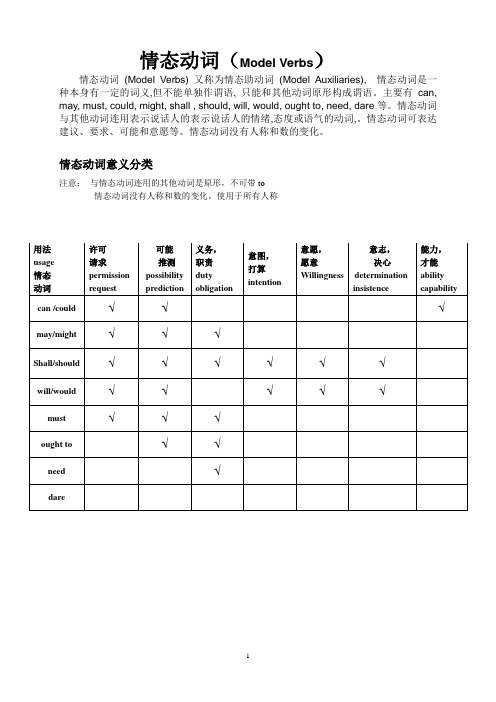
情态动词(Model Verbs)情态动词(Model Verbs) 又称为情态助动词(Model Auxiliaries), 情态动词是一种本身有一定的词义,但不能单独作谓语, 只能和其他动词原形构成谓语。
主要有can, may, must, could, might, shall , should, will, would, ought to, need, dare等。
情态动词与其他动词连用表示说话人的表示说话人的情绪,态度或语气的动词,。
情态动词可表达建议、要求、可能和意愿等。
情态动词没有人称和数的变化。
情态动词意义分类注意:与情态动词连用的其他动词是原形,不可带to情态动词没有人称和数的变化,使用于所有人称一.can 和could 的用法:1.表示:能力ability and capacity 意“能够”表示人或动物的内在能力即有某种知识或者技能而能够做某事。
有时可以和be ableto互换。
He can swim across the river ( He is able to swim across the river)Can she speak English ? ( Is she able to ----)He hurt his foot and couldn't (wasn't able to) play football. 他脚受了伤,所以他不能踢足球了。
can 和be able to 的区别:(1)表示能够时,can只能用在现在时(can)和(could)过去时。
而be able to 可用于各种时态The baby will be able to walk next month 将来时,不能用I hope to be able to see her again 不定式,不用(2)be able to暗指做成了某一事情。
(manage to)Because he worked hard, he was able to pass his examination. 因为他努力工作,所以他能及格。
情态动词后跟动词原形的原理

情态动词后跟动词原形的原理情态动词是一类用来表示说话人对行为可能性、能力、愿望等态度的助动词,而它们后面通常跟着动词的原形。
主要的情态动词包括can、could、will、would、shall、should、may、might、must 等。
这种情态动词后跟动词原形的结构存在一定的原理和规律,主要包括以下几点:1. 表示可能性:情态动词can、could、may、might 表示可能性,后面跟随动词原形。
例如:- He can swim.(他会游泳。
)- She may join us later.(她可能随后加入我们。
)2. 表示能力:情态动词can、could 表示能力,后面跟随动词原形。
例如:- I can speak Spanish.(我能说西班牙语。
)- She could play the piano when she was five.(她五岁时就能弹钢琴。
)3. 表示意愿和建议:情态动词will、would、shall、should 表示意愿和建议,后面跟随动词原形。
例如:- I will help you.(我会帮助你。
)- You should eat more vegetables.(你应该多吃蔬菜。
)4. 表示必要性:情态动词must 表示必要性,后面跟随动词原形。
例如:- You must finish your homework.(你必须完成你的作业。
)5. 表示许可和请求:情态动词can、could、may、might 表示许可,而can、could、will、would 表示请求,后面都跟随动词原形。
例如:- Can I use your phone?(我能用你的手机吗?)- Could you pass me the salt?(你能把盐递给我吗?)总的来说,情态动词后跟动词原形的原理主要是在语法上的规定,用来构成不同的句子结构,表达不同的语境和含义。
这种结构的使用帮助准确表达说话人的态度、愿望、建议等语义信息。
13个情态动词表格归纳

13个情态动词表格归纳情态动词是一类特殊的助动词,用于表示说话人对某种行为或状态的推测、可能性、意愿、能力、许可和义务等。
以下是13个常见的情态动词:情态动词含义例句can能够I can swim.could过去能力We could run fast when we were young.may可能He may be at home.might可能(过去) They might have left already.shall将要Shall we go to the park tomorrow?should应该You should brush your teeth twice a day.will将要She will visit her grandparents next month.would愿意/过去习惯We would go hiking on weekends.must必须You must wear a seatbelt in the car.must not禁止You must not smoke here.need需要The plants need water to grow.need not不需要You need not come to the meeting.ought to应该You ought to apologize for your behavior.拓展:除了以上列出的13个常见的情态动词外,还有其他的情态动词,如:dare(敢)、used to(过去常常)、would rather(宁愿)、have to(不得不)、had better(最好)等。
这些情态动词也有各自的用法和含义,可以根据实际需要进行学习和运用。
情态动词总结及翻译题

1.can 能(力)+ 可能+ 允许2.be able to do 经过一番努力做成某事(=manage to dosth)3.may 也许+ 允许+ 句首祝愿4.might 也许(可能性比may小)5.may/might as well do sth不妨做某事6.can’t 不能+ 不可能7.must 必须(主观)——mustn’t 禁止肯定(猜测)——can’t 不可能偏偏,非要Must you shout so loudly ?Must you smoke here?猜测must do 肯定be doing 肯定正在做have done sth肯定已经做8.mustn’t 禁止9.don’t have to 不必= needn’t do / don’t need to do10.shall 语气(允诺,命令,警告,决心)征求意见Shall he come to see you?要不要让他来见你11.should1.应该2(义务+在情理之中的可能)2.虚拟语气3.竟然4.在lest , for fear that , in case , 等引起的从句中,其谓语用should +动词原形。
He cleans the glass with care for fear that he should break it .5.should带感情色彩,常用在why , how 开头的疑问句中。
Why should I invite him ?How should I know .11.will 意愿I will do it .倾向Fish will die out of water.难免,毕竟Accident will happen .事故难免会发生。
Boys will be boys.男孩毕竟是男孩。
12.would 当时,奶奶老是(would)坐在那里看报纸13.need /dare 否定句和疑问句用法你不必去那里(want)( can)需要他去那里么?(want)(can)14.need doing sth/ need to be done 需要被做某事(花朵需要浇水)15.dare它既可以作形为动词又可以作情态动词,作情态动词时,主要用于疑问句,否定句及条件句中,陈述句中很少使用但(I dare say )除外。
情态动词及非谓语动词的用法

情态动词及非谓语动词的用法情态动词常见的情态动词有:can /could能may 可以would (表意愿)need 需要must 必须have to 不得不should 应该1.can,could 的用法1.1表能力,有“能”、“会”、“能够”的意思例如:Can you drive a car? 你会开车吗?-----Yes, I can. 我会-----No, I can't. 我不会。
1.2表允许,在口语中代替may,有“可以”的意思.例如:Can I use your bike?我可以用你的自行车吗?1.3表示可能性,常用于否定句和疑问句例如:Can it be true?那会是真的吗?Today is Sunday. He can't be at school.今天是星期天。
他不可能在学校里。
1.4过去式could表示的语气更加委婉.例如:Could I come to see you tomorrow?明天我可以来见你吗?2.may的用法2.1表示许可或征求对方的许可,有“可以”的意思。
例如:You may go now.你可以走了。
May I use your computer?我用一下你的电脑可以吗?2.2回答以may开头的疑问句有如下表达法:例如:May I smoke here? 我可以在这儿抽烟吗?-----Yes, you may. -----Yes, please.-----No, you can't.------No, you mustn't.------No, you'd better not.2.3表示猜测,通常只用于陈述句.例如:You may be right.你可能是对的。
在口语中can可以代替may表示许可,但can较随便,may更正式例如:Can I use your bike, John?约翰,我可以用一下你的自行车吗?May I have a look at your license please, sir?先生,我可以看一下你的执照吗3.must 的用法3.1表义务,“必须”例如:You must talk to them about their study.你必须同他们谈谈关于他们学习的事。
情态动词知识点(大全)1

情态动词知识点(大全)1一、初中英语情态动词1. Look! The traffic light has turned red. We _____ stop our car.A. canB. can'tC. mustD. mustn't【答案】 C【解析】【分析】句意:看交通灯成了红灯。
我们必须停车。
turned灯成了红灯;stop sth停止某物A. can能; B. can't不能; C. must必须; D.mustn't千万别,一定不要。
根据常识可知红灯停,这是必须的,故选C2.—Where is Monica? I can't find her anywhere.—She be in the library. She loves reading books when she is free.A. mustB. needC. can't【答案】 A【解析】【分析】句意:——莫妮卡在哪?我到处都找不到她。
——她肯定在图书馆,她喜欢空闲时看书。
A肯定,肯定句中表示推测,B需要,C不可能,否定句中表示推测,根据 She loves reading books when she is free ,可知是肯定句表示推测,故选A。
【点评】考查情态动词,注意情态动词表推测的用法。
3.— Sorry, I forgot to take money with me. Maybe I can't buy the book you like.— Mum, you ______ worry about it. We can pay by Alipay (支付宝).A. can'tB. needn'tC. mustn'tD. shouldn't【答案】 B【解析】【分析】句意:——对不起,我忘记带钱了。
也许我不能买你喜欢的书。
- 1、下载文档前请自行甄别文档内容的完整性,平台不提供额外的编辑、内容补充、找答案等附加服务。
- 2、"仅部分预览"的文档,不可在线预览部分如存在完整性等问题,可反馈申请退款(可完整预览的文档不适用该条件!)。
- 3、如文档侵犯您的权益,请联系客服反馈,我们会尽快为您处理(人工客服工作时间:9:00-18:30)。
21.1 情态动词的语法特征1)情态动词不能表示正在发生或已经发生的事情,只表示期待或估计某事的发生。
2)情态动词除ought 和have 外,后面只能接不带to 的不定式。
3)情态动词没有人称,数的变化,即情态动词第三人称单数不加-s。
4)情态动词没有非谓语形式,即没有不定式,分词,等形式。
1)情态动词不能表示正在发生或已经发生的事情,只表示期待或估计某事的发生。
2)情态动词除ought 和have 外,后面只能接不带to 的不定式。
3)情态动词没有人称,数的变化,即情态动词第三人称单数不加-s。
4)情态动词没有非谓语形式,即没有不定式,分词,等形式。
1)can could 表示能力;可能(过去时用could),只用于现在式和过去式(could)。
be able to可以用于各种时态。
They will be able to tell you the news soon. 他很快就能告诉你消息了。
2)只用be able toa. 位于助动词后。
b. 情态动词后。
c. 表示过去某时刻动作时。
d. 用于句首表示条件。
e. 表示成功地做了某事时,只能用was/were able to,不能用could。
He was able to flee Europe before the war broke out.= He managed to flee Europe before the war broke out.注意:could不表示时态1)提出委婉的请求,(注意在回答中不可用could)。
--- Could I have the television on?--- Yes, you can. / No, you can't.2)在否定,疑问句中表示推测或怀疑。
He couldn't be a bad man.他不大可能是坏人。
1)表示允许或请求;表示没有把握的推测;may 放在句首,表示祝愿。
May God bless you!He might be at home.注意:might 表示推测时,不表示时态。
只是可能性比may 小。
2)成语:may/might as well,后面接不带to 的不定式,意为"不妨"。
If that is the case, we may as well try.典型例题Peter ___come with us tonight, but he isn't very sure yet.A. mustB. mayC. canD. will答案 B. 表可能性只能用may.此句意可从后半句推出。
1)两词都是'必须'的意思,have to 表示客观的需要,must 表示说话人主观上的看法,既主观上的必要。
My brother was very ill, so I had to call the doctor in the middle of the night.我弟弟病得很厉害,我只得半夜里把医生请来。
(客观上需要做这件事)He said that they must work hard. 他说他们必须努力工作。
(主观上要做这件事)2)have to有人称、数、时态的变化,而must只有一种形式。
但must 可用于间接引语中表示过去的必要或义务。
He had to look after his sister yesterday.3)在否定结构中:don't have to表示"不必"mustn't表示"禁止",You don't have to tell him about it.你不一定要把此事告诉他。
You mustn't tell him about it.你一定不要把这件事告诉他。
1) must用在肯定句中表示较有把握的推测,意为"一定"。
2) must表对现在的状态或现在正发生的事情的推测时,must 后面通常接系动词be 的原形或行为动词的进行式。
You have worked hard all day.You must be tired.你辛苦干一整天,一定累了。
(对现在情况的推测判断)He must be working in his office. 他一定在办公室工作呢。
比较:He must be staying there.他现在肯定呆在那里。
He must stay there.他必须呆在那。
3) must 表示对已发生的事情的推测时,must 要接完成式。
I didn't hear the phone. I must have been asleep.我刚才没有听到电话,我想必是睡着了。
4) must表示对过去某时正发生的事情的推测,must 后面要接不定式的完成进行式。
---Why didn't you answer my phone call?---Well, I must have been sleeping, so I didn't hear it.5) 否定推测用can't。
If Tom didn't leave here until five o'clock, he can't be home yet.如果汤姆五点才离开这儿,他此时一定还未到家。
can, could, may, might, must 皆可表示推测,其用法如下:1)情态动词+动词原形。
表示对现在或将来的情况的推测,此时动词通常为系动词。
I don't know where she is, she may be in Wuhan.2)情态动词+动词现在进行时。
表示对现在或将来正在进行的情况进行推测。
At this moment, our teacher must be correcting our exam papers.这时,我们老师想必在批改试卷。
3)情态动词+动词完成时。
表示对过去情况的推测。
We would have finished this work by the end of next December.明年十二月底前我们很可能已完成这项工作了。
The road is wet. It must have rained last night.地是湿的,昨天晚上一定下雨了。
4)情态动词+动词的现在完成进行时。
表示对过去正在发生事情的推测。
Your mother must have been looking for you.你妈妈一定一直在找你。
5)推测的否定形式,疑问形式用can't, couldn't表示。
Mike can't have found his car, for he came to work by bus this morning.迈克一定还没有找回他的车,因为早上他是坐公共汽车来上班的。
注意:could, might表示推测时不表示时态,其推测的程度不如can, may。
1) may(might) have + done sth, can (could) have + done sth表示过去,推测过去时间里可能发生的事情。
Philip may (might) have been hurt seriously in the car accident.Philip can (could) have been hurt seriously in the car accident.2)must have +done sth,对过去时间里可能发生的事情的推测,语气较强,具有"肯定","谅必"的意思。
---Linda has gone to work, but her bicycle is still here. ---She must have gone by bus.3) ought to have done sth, should have done sth本应该做某事,而事实上并没有做。
否定句表示"不该做某事而做了"。
You ought to (should) have been more careful in this experiment.He ought not to have thrown the old clothes away.(事实上已扔了。
)ought to 在语气上比should 要强。
4) needn't have done sth本没必要做某事I dressed very warmly for the trip, but I needn't have done so. The weather was hot.5) would like to have done sth本打算做某事I would like to have read the article, but I was very busy then.should 和ought to 都为"应该"的意思,可用于各种人称。
---Ought he to go?---Yes. I think he ought to.表示要求,命令时,语气由should(应该)、had better最好)、must(必须)渐强。
had better 相当于一个助动词,它只有一种形式,它后面要跟动词原形。
had better do sthhad better not do sthIt is pretty cold. You'd better put on my coat.She'd better not play with the dog.had better have done sth表示与事实相反的结果,意为"本来最好"。
You had better have come earlier.would rather dowould rather not dowould rather… than…宁愿……而不愿。
还有would sooner, had rather, had sooner都表示"宁愿"、"宁可"的意思。
If I have a choice, I had sooner not continue my studies at this school.I would rather stay here than go home. = I would stay here rather than go home.典型例题----Shall we go skating or stay at home?----Which ___ do?A. do you ratherB. would you ratherC. will you ratherD. should you rather答案B。
